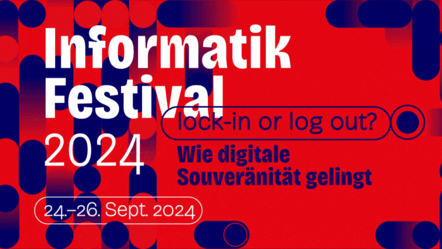FZI Live
Künstliche Intelligenz im Mittelstand (KI-KMU 2024)
Fifth workshop at the INFORMATIK Festival 2024, the 54th Annual Conference of the German Informatics Society
The workshop “Künstliche Intelligenz im Mittelstand” (Artificial Intelligence in SMEs) at the INFORMATIK Festival 2024, the 54th Annual Conference of the German Informatics Society, aims to bring together AI researchers and users, promote knowledge transfer between and among the two groups and make the subject of AI in SMEs more tangible.
The general use of Artificial Intelligence (AI) in German companies is gaining ground over various business processes. More and more small and medium-sized companies see AI as an opportunity for the German economy.
The potential of AI in SMEs lies in many areas, such as the optimization of distribution and logistics, increasingly targeted advertising, and direct or indirect enhancement of sustainability. The latter is, for instance, achievable through an increased process efficiency (economic sustainability), a reduction of costs, the avoidance of unnecessary resource exploitation, and the reduction of scrap and environmental impact (ecological sustainability). Technologies such as intelligent automation, sensor technology, and assistance systems are particularly important here.
The workshop “Künstliche Intelligenz im Mittelstand (KI-KMU 2024)” aims to bring together AI researchers and users, promote knowledge transfer between and among the two groups, and make the subject of AI in SMEs more tangible. The workshop will focus on two areas. On the one hand, research approaches that are strongly related to the challenges of AI in SMEs or that deal with lightweight AI applications that are easily integrable in SMEs will be presented. On the other hand, completed or ongoing pilot projects will also be presented, providing an initial insight into the impact of AI in practice and highlighting the challenges that arise with AI implementation.
As target group, the workshop addresses researchers and users (especially SMEs) of AI approaches in various application areas.
Workshop subjects
9:00 - 9:30 a.m.
Welcome and Introduction of Organizer Team
- Benjamin Coban (FZI Research Center for Information Technology)
- Iuliana Nichersu (FZI Research Center for Information Technology)
- Prof. Hans Brandt-Pook (Hochschule Bielefeld)
9:30 - 10:00 a.m.
Keynote
Martin Rückert, Chief AI Officer at Diamant Software
Topic of lecture: “”KI im Mittelstand – möglich & nötig” (AI in small and mid-sized enterprises – possible & required)”
10:00 - 11:00 a.m.
Lectures #1
Cristina Mihale-Wilson and Maximilian Lowin
Topic of lecture: “A Guide for Trustworthy AI implementations in the Smart Living Domain”
Maximilian Lowin and Cristina Mihale-Wilson
Topic of lecture: “Functional Requirements and Recommendations for AI-based Sustainable Energy Solutions”
Reinhold von Schwerin, Daniel Schaudt and Alexander Hafner
Topic of lecture: “Umsetzung von KI-Transferprojekten: Einblick in die Risiken und Realitäten” (Implementation of AI transfer projects: Insight into the risks and realities)
11:00 - 11:30 a.m.
Coffee Break
11:30 - 12:30 a.m.
Lectures #2
Frederik Hering
Topic of lecture: “A multi-label text classifier approach for understanding electronic word-of-mouth of restaurants on Google Maps”
Thomas Schmitt, Maximilian Bundscherer and Tobias Bocklet
Topic of lecture: “Training a Computer Vision Model for Commercial Bakeries with Primarily Synthetic Images”
Frederik Simon Bäumer, Hans Brandt-Pook, André Matutat, Falk Maoro, David Pelkmann and Sergej Schultenkämper
Topic of lecture: “Lektionen und Anwendungsfälle aus der Implementierung von Retrieval-Augmented-Generation-Systemen” (Lessons and use cases from the implementation of retrieval augmented generation systems)
12:30 - 2:00 p.m.
Lunch Break
2:00 - 3:30 p.m.
Lectures #3
Roland Kammerbauer, Thomas Schmitt and Tobias Bocklet
Topic of lecture: “Segmenting Wood Rot using Computer Vision Models”
Maximilian Bundscherer, Thomas Schmitt and Tobias Bocklet
Topic of lecture: “Machine Learning in Glass Bottle Printing Quality Control: A Collaboration with a Medium-Sized Industrial Partner”
Armin Lenzen, Max Moeller and Maximilian Rohrer
Topic of lecture: “Schadenserkennung an Baukonstruktionen mit intelligenten Methoden der Systemidentifikation” (Damage detection on buildings with intelligent system identification methods)
Jacqueline Höllig, Florian Grimm, Daniel Kiefer and Steffen Thoma
Topic of lecture: “Taking a HINT on Industrial Anomaly Detection”
3:30 - 4:30 p.m.
Coffee Break
4:30 - 5:30 p.m.
Panel Discussion
Topics: “Erfahrungen KI im Mittelstand und Zukunft des Workshops” (Experiences of AI in SMEs and the future of the workshop)
Organizing Committee
- Natalja Kleiner, FZI Research Center for Information Technology, Karlsruhe
- Prof. Hans Brandt-Pook, Hochschule Bielefeld
- Benjamin Çoban, FZI Research Center for Information Technology, Karlsruhe
- Dr. Frederik Bäumer, Hochschule Bielefeld
- Katja Alexandrakis, FZI Research Center for Information Technology, Karlsruhe
- Dr.-Ing. Iuliana NichersuFZI Research Center for Information Technology, Karlsruhe
Program Committee
This year’s workshop will be supported by a broad consortium whose partners will be contributing their respective networks to the workshop:
- Transferzentrum für Digitalisierung, Analytics & Data Science Ulm
- Network for applied AI at the HTWK Leipzig
- Zentrum für künstliche Intelligenz Mecklenburg-Vorpommern, University of Rostock
- Technologietransferzentrum Digitale Intelligenz Oberfranken, TH Nürnberg
- Hochschule Bielefeld
- FZI Research Center for Information Technology, Karlsruhe
Note on the event:

